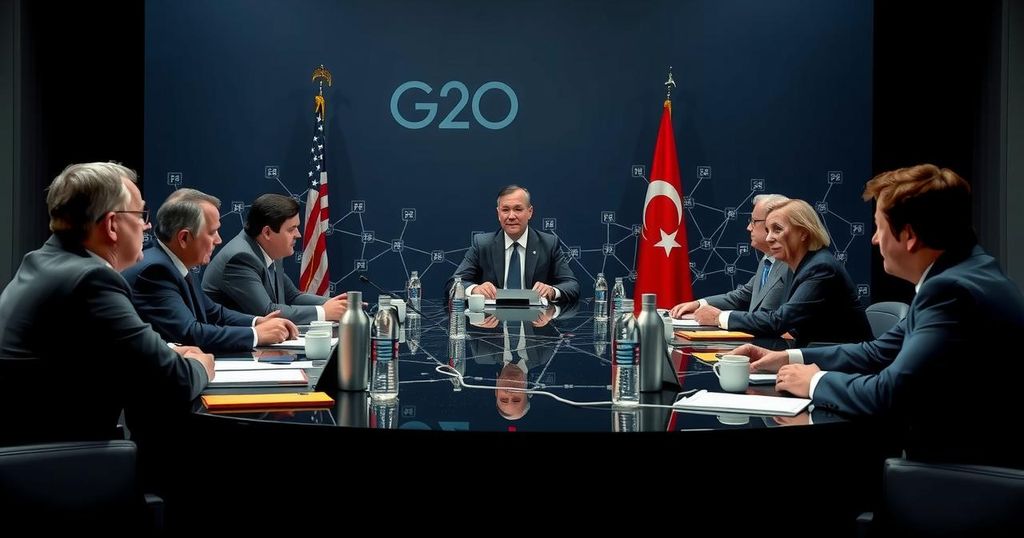Global news
Technology
AFP, AMAZON, ANTONIO GUTERRES, ASIA, AZERBAIJAN, BIDEN, BILATERAL TALKS, BRAZIL, DONALD TRUMP, GEOPOLITICS, INTERNATIONAL RELATIONS, JOE BIDEN, LIMA, LU, LUIZ INACIO LULA DA SILVA, MINISTRY, NORTH AMERICA, PERU, REGIONAL COOPERATION, SOUTH AMERICA, TRUMP, UN, UNITED STATES, WHITE HOUSE, XI JINPING
Jamal Walker
0 Comments
G20 Summit in Brazil: Climate, Global Conflicts, and Economic Inequality
The G20 summit in Brazil aims to address climate negotiations and global conflicts, notably in Ukraine and the Middle East. President Biden’s participation marks his last summit while promoting issues of poverty and climate change. Tensions surrounding climate finance and differing national agendas present challenges as leaders seek to find common ground. Brazil’s Lula advocates taxation on billionaires amidst resistance from some nations, including Argentina.
The G20 summit commenced in Brazil, focusing on climate negotiations and global conflicts, particularly in the Middle East and Ukraine. This year’s gathering will be President Joe Biden’s final summit as he embarks on a farewell diplomatic tour. Brazilian President Luiz Inacio Lula da Silva aims to spotlight pressing issues such as poverty and climate change during his presidency. The summit faces challenges as tensions over climate finance commitments loom, and discussions regarding Ukraine and the Middle East will dominate the agenda. In light of Biden’s recent authorization for Ukraine to utilize long-range missiles against Russian targets, there is speculation that this could influence European allies’ perspectives. Furthermore, G20 leaders are tasked with revitalizing the stalled UN climate negotiations in Azerbaijan, with a pressing need to secure $1 trillion annually to mitigate climate change impacts on developing nations. The meeting occurs amidst a backdrop of heightened security, prompted by recent extremist activities in Brazil. The urgent need to address the effects of climate change has taken center stage as countries aim to reconcile diverging interests within the group. Lula’s statements express a concern that global conflicts should not detract from pressing issues affecting those in poverty. Additionally, Brazil is advocating for increased taxation on billionaires, though this proposal faces resistance, particularly from Argentina’s newly elected president. The summit seeks to foster cooperation among nations, balancing national interests with collective global responsibilities.
The G20 summit is a pivotal international forum comprising the world’s major economies, where leaders convene to address pressing global issues. In recent years, the summit has increasingly grappled with climate change, international conflicts, and economic inequality. Brazil’s hosting of the summit signifies a continued emphasis on social justice and environmental sustainability, reflective of President Lula’s administration. This particular summit comes at a critical juncture, as former President Donald Trump is anticipated to return to political prominence, potentially influencing global dynamics. As climate discussions remain stalled, particularly regarding financial commitments for the developing world, the summit strives to ignite renewed dialogue and action.
The G20 summit in Brazil serves as a crucial platform for addressing global crises, combining discussions on climate change and ongoing geopolitical conflicts. With a focus on poverty and sustainability, leaders aim to navigate divergent agendas while fostering cooperative efforts. As Biden concludes his presidential engagement in this forum, the ramifications of Trump’s return loom large, further complicating international relations. Proposals such as higher taxation on the wealthy will demand careful negotiation among the diverse interests represented at the summit.
Original Source: www.fox28spokane.com




Post Comment